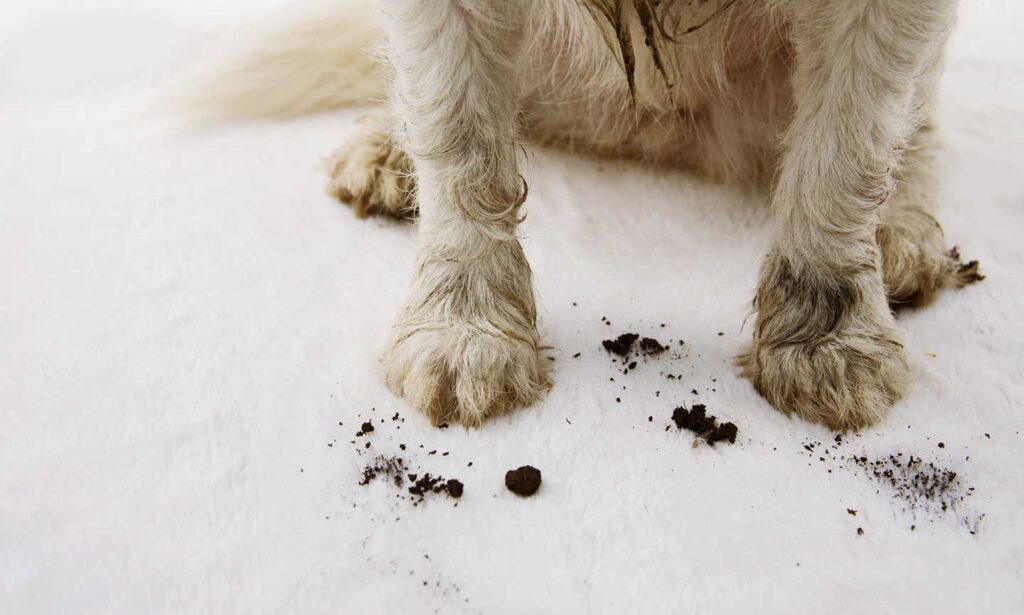Dog Corns (AKA Paw Pad Keratoma): What Is It? And How Do Vets Treat It?

Photo by Vitalina Nakonechna/iStock/Getty Images Plus
This content was reviewed by veterinary professionals to answer your most common questions about this topic. This content shouldn’t take the place of advice by your vet.
Dog corns are painful, dense lesions that typically form on a dog’s paw pads. And while paw pad keratoma (or dog corns) is completely benign—meaning it’s a non-cancerous growth—these tough little buggers can amount to quite a bit of pain for your pooch. What’s more, without proper care, they can lead to complications such as infections, limping and even lameness.
As a pet parent, it’s important to learn how to identify corns in dogs so you can be on the lookout and act swiftly. Keep reading to learn more about dog corns, including what causes them, common signs and symptoms, and the best treatment options.
What Are Dog Corns?
Also known as hyperkeratosis or paw pad keratoma, dog corns are—as mentioned earlier—painful, dense lesions that typically form on a dog’s paw pads. “These lesions are characterized by well-defined, raised areas with excess keratin, often taking on a conical shape at the center,” says Dr. Becca Boronat, DVM, a Charleston, South Carolina–based veterinarian at Best Friends Animal Society, a national animal welfare organization.
What Causes Corns in Dogs?
Dog corns can occur in any dog breed and at any age, but they aren’t extremely common. Rather, they occur more frequently in active racing, retired middle-aged and older sight hounds (particularly Greyhounds and Whippets), as well as other athletic or working breeds.
Dog corns aren’t 100 percent understood, but there are several theories as to why they develop. Here are some commonly accepted theories:
- Scar tissue and foreign bodies: “Some suggest that cuts or punctures on the paw pad can lead to the accumulation of scar tissue,” Dr. Boronat says. “Foreign bodies lodged in the pad may also contribute, with scar tissue forming around them, resulting in the development of corns.”
- Papillomavirus infection: Another theory proposes that corns may result from an infection by the papilloma virus. Dr. Boronat says this virus infection may cause growths that penetrate deeper layers of the pad, leading to the formation of these painful, corn-like lesions.
- Pressure and abrasion: “Repetitive mechanical trauma, such as pressure and abrasion from walking or running, is considered a contributing factor,” Dr. Boronat notes. “This theory is particularly relevant in breeds that are more prone to corns due to their activities, such as racing Greyhounds.”
Other contributing factors include genetics, environmental conditions (such as those dogs who experience repeated pressure, abrasion or walking on hard surfaces) and conformation abnormalities, says Dr. Jessica Jensen, DVM, a veterinarian with The Vets in Las Vegas, Nevada. They are also more commonly found on the foot pads of older dogs.
While these theories and frequently seen factors may provide insights into potential causes, it’s important to note that the exact mechanism behind dog corns varies from pup to pup.
Symptoms and Signs of Dog Corns
Given that these corns show up on a dog’s feet, most of the signs and symptoms are related to their movement. This is because walking or standing forces the corn deeper into the skin tissue, which causes discomfort and pain. Dr. Jensen says to be on the lookout for the following:
- Limping or lameness, particularly when walking or standing
- Reluctance to put weight on the affected paw
- Excessive licking or chewing at the foot or toes
- Swelling or redness between the toes
- Discomfort or pain when the affected area is touched or manipulated
- Notable nail growth on the affected paw, due to reduced activity
- Visible small, hard, raised nodules or lesions between the toes
“If pet parents notice any of these signs or symptoms, they should promptly consult a veterinarian for proper diagnosis and treatment,” Dr. Jensen advises.
How Vets Diagnose Dog Corns
If you suspect your sweet pup has paw pad keratoma, schedule an appointment with the veterinarian right away. They’ll be able to determine whether your dog is dealing with these painful lesions and provide a treatment plan to help your pup find relief.
“Veterinarians are trained to properly diagnose and treat conditions like corns,” Dr. Boronat says. She adds that vets will also perform an X-ray or radiographic test (RT) of the affected paw to rule out another issue such as a foreign body. They will also rule out things that look similar but aren’t quite the same, such as calluses and other skin conditions.
How To Treat Dog Corns
Early detection and appropriate treatment are essential for relieving discomfort and preventing complications associated with dog corns. Once your vet confirms a diagnosis, the proper treatment will depend on the severity of the condition.
Dr. Jensen shares some common methods for treating corns in dogs:
- Hulling/surgical removal: In mild cases, dog corns may be trimmed (hulled). In more severe cases, they may require surgical excision. In repeated and/or severe cases of dog corns, your veterinarian may recommend a full amputation of the digit, meaning the complete removal of the affected toe.
- Topical treatments: Medicated creams and ointments may be prescribed to help reduce inflammation and promote healing of the affected area.
- Orthopedic support: “In cases where abnormal foot conformation contributes to the development of corns, orthopedic supports or custom-made booties may be recommended to alleviate pressure on the affected area,” Dr. Jensen says.
- Foot soaks: Soaking the affected paw in warm water or an antiseptic solution can help soften the corns and reduce discomfort. This may be recommended as part of a home care regimen.
Once your pet’s corns have been addressed, your veterinarian may prescribe pain medications and/or anti-inflammatory drugs to help provide some relief. They’ll also have at-home care instructions, which may include keeping your pup off their feet, bandaging the paw to help relieve pressure while it heals.
They’ll also want you to monitor the area for signs of infection, such as redness or pus. Some veterinarians may recommend a follow-up appointment to check on your dog’s status and/or continue pain medications as necessary.
How To Prevent Corns in Dogs
To prevent dog corns, Dr. Boronat says to regularly check your dog’s paw pads for issues, trim their nails routinely and use protective booties. Some additional ways you can prevent these lesions is to allow your pup to walk on soft rather than hard surfaces, keep them at a healthy weight, and manage any and all underlying health conditions.
As always, it’s best to consult with your veterinarian for personalized advice and treatment options for your dog’s corns. They’ll be able to provide you with the best plan of action, and they may have recommendations for lifestyle changes that can help improve your pup’s overall well-being. Meanwhile, familiarize yourself with common skin conditions so you can be at the ready to jump into action no matter what your pup is going through.
Expert input provided by Dr. Becca Boronat, DVM, a Charleston, South Carolina–based veterinarian at Best Friends Animal Society, a national animal welfare organization; and Dr. Jessica Jensen, DVM, a veterinarian with The Vets in Las Vegas, Nevada.



